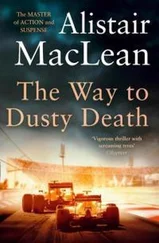“I’d like to start the ball rolling by asking you all to be my guests for a brief period this evening. Today, ladies and gentlemen, my wife celebrates her birthday.” He smiled down at Mrs. Beresford. “She forgets exactly which one. I cannot invite you to a birthday dinner, for what could I offer you as a special meal that Antoine and Henriques do not give us every night of the week? But Mrs. Beresford and I should be grateful if you would be our guests at a cocktail party this evening. Seven forty-five. In the drawing-room. Thank you.”
I looked round the table. Miguel Carreras was nodding slightly, as if in grave acceptance and appreciation of Beresford’s underlying motives. Miss Harrbride was beaming with pleasure: she doted on the Beresfords, not for their money but for the fact that they were one of the very oldest American families, with goodness only knew how many generations behind them. Mr. Greenstreet, her husband, studied the tablecloth in his usual intent fashion. And Tony Carreras, more impossibly handsome than ever, leaned back in his chair and regarded Julius Beresford with a slightly amused, speculative interest. Or maybe it was Susan Beresford he was looking at; I was more certain than ever that there was something wrong with Tony Carreras’s eyes; it was almost impossible to tell in what direction they were looking. He caught my glance and smiled.
“You’ll be there, Mr. Carter?” He had that relaxed easygoing manner that comes from having a bank account bursting at the seams, but none of the usual hint of condescension: Tony Carreras I could get to like.
“Briefly, only, I’m afraid. I have to go on watch at eight o’clock this evening.” I smiled. “If you’re still at it at midnight, I’ll join you.” Like hell I’d join them: at midnight I’d be showing the Nassau police over the ship. “And I’m afraid you’ll have to excuse me now: I have to relieve the officer of the watch.”
I made my excuses and left. On the deck I almost bumped into a sandy-haired young seaman, Whitehead, who usually shared my watches on the bridge in his capacity as engine-room telegraphist, lookout, bridge messenger and coffee-maker.
“What are you doing here?” I asked sharply. With young Dexter on watch I wanted as many sharp eyes and quick minds as possible around him: Whitehead had both. “You know you’re not to leave the bridge in my absence.”
“Sorry, sir. But Ferguson sent me.” Ferguson was the quarter-master on the forenoon watch. “We’ve missed the last two course alterations and he’s getting pretty worried about it.” We were bringing round three degrees to the north every fifteen minutes to get on a north by west course, but slowly, so as not to excite anyone.
“Why come and bother me about it?” I said irritably. “Fourth Officer Dexter is perfectly capable of handling these matters.” He wasn’t, but one of the drawbacks of being a fellow-officer of Dexter was that you were forced to lie like fury to maintain an outward appearance of solidarity.
“Yes, sir. But he’s not there, Mr. Carter. He left the bridge about twenty minutes ago and he hasn’t come back yet.”
I pushed violently past Whitehead, knocking him to one side, and made for the bridge at a dead run, three steps at a time up the companionways. Rounding one corner I caught a glimpse of Whitehead staring up after me with a most peculiar expression on his face. He probably thought I had gone mad.
V
Wednesday 8.45 a.m. – 3.30 p.m.
Ferguson, a tall swarthy saturnine Cockney with no hair left to speak of, glanced round as I burst through the doorway from the starboard wing of the bridge into the wheelhouse. His face showed his relief.
“Strewth, am I glad to see–”
“Where’s the fourth mate?” I demanded.
“Search me, sir. Them course alterations–”
“To hell with the course alterations! Where did he go?”
Ferguson blinked in surprise. He had the same look on his face as Whitehead had had a few seconds ago, the wary bafflement of a man who sees another going off his rocker.
“I don’t know, sir. He didn’t say.”
I reached for the nearest phone, got through to the dining-room, asked for Bullen. He came on and I said: “Carter here, sir. Could you come up to the bridge straightaway?”
There was a brief pause, then: “Why?”
“Dexter’s missing, sir. He had the watch but he left the bridge twenty minutes ago.”
“Left the bridge.” Bullen’s voice held no inflexion, but only because he made it that way. Lord Dexter’s son or not, young Dexter was finished on the Campari unless he could explain this one away. “Looked for him yet? He could be anywhere.”
“That’s what I’m afraid of, sir.”
The phone clicked and I hung up. Young Whitehead, still looking apprehensive, had just arrived in the cabin. I said: “You’ll find the third mate in his cabin. My compliments to him, ask him if he’ll take over the bridge for a few minutes. Ferguson?”
“Sir?” The voice was still wary.
“Mr. Dexter said nothing at all when he left?”
“Yes, sir. I heard him say something like ‘Wait a minute, what the hell’s going on here?’ Or something like that, I can’t be sure. Then he said: ‘Keep her as she is. Back in a jiffy,’ and then he was off.”
“That was all?”
“That was all, sir.”
“Where was he standing at the time?”
“On the starboard wing, sir. Just outside the door.”
“And he went down that side?”
“Yes, sir.”
“Where was Whitehead at the time?”
“Out on the port wing, sir.” Ferguson’s expression and tone showed beyond all doubt that he was vis-à-vis with a loony, but he was playing it cool all the same.
“Didn’t cross to see where Mr. Dexter had gone?”
“No, sir.” He hesitated. “Well, not right away. But I thought it a bit funny so I asked him to have a look. He couldn’t see anything.”
“Damn! How long after Mr. Dexter left before he took this look?”
“A minute. Maybe closer on two. Couldn’t be sure, sir.”
“But whatever Mr. Dexter saw, it was aft?”
“Yes, sir.”
I moved out on to the wing bridge and looked aft. There was no one to be seen on any of the two decks below. The crew had long finished washing down decks and the passengers were still at breakfast. Nobody there. Nothing of any interest at all to be seen. Even the wireless office was deserted, its door closed and locked. I could see the brass padlock clearly, gleaming and glittering in the morning sun as the Campari pitched slowly, gently, through the ever-lengthening swell.
The wireless office! I stood there perfectly rigid for all of three seconds, a candidate, in Ferguson’s eyes, for a strait-jacket if ever there had been one, then took off down the companionway the same way as I had come up, three steps at a time. Only a smart piece of braking on my part and a surprisingly nimble bit of dodging on the captain’s prevented a head-on collision at the foot of the companionway. Bullen put into words the thought that was obviously gaining currency around the bridge.
“Have you gone off your bloody rocker, Mister?”
“The wireless office, sir,” I said quickly. “Come on.”
I was there in a few seconds, Bullen close behind. I tried the padlock, a heavy-duty double-action Yale, but it was securely locked.
It was then I noticed a key sticking out from the bottom of the padlock. I twisted it, first one way, then the other, but it was jammed fast. I tried to pull it out and had the same lack of success. I became aware that Bullen was breathing heavily over my shoulder.
“What the devil’s the matter, Mister? What’s got into you all of a sudden?”
Читать дальше
Конец ознакомительного отрывка
Купить книгу












